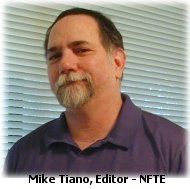|
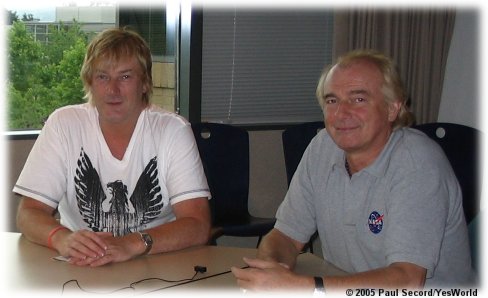
When it was
clear that the More Drama tour was in jeopardy it was apparent that
this conversation's posting on NFTE would be too. Prior to that
Alan and Geoff consented to discuss their involvement in the band
White and its participation in that tour--which included Chris
Squire with Syn and Steve Howe performing solo--and both were eager
to get that tour started. However as we all know the tour was
cancelled due to visa problems for the members and crew who were
trying to get out of the UK.
Whether the
More Drama tour will reemerge still remains to be seen.
Nevertheless Alan and Geoff's discussion about
that tour was interesting from a historical
perspective. Furthermore the discussion of White and the DRAMA
days were compelling enough to warrant posting this interview, and
Alan advised he also would like to see it appear, so here it is.
MOT
MIKE TIANO: First thing I thought I'd do to start with is to ask you, Alan,
to give a brief history of
the band White. Just how did this whole
project come about?
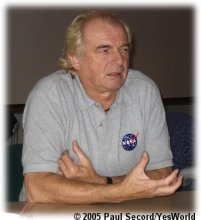 ALAN WHITE: It stems from Merkaba, which was a local band in Seattle. It had
a reputation... a few people left, few people joined and that kind of
thing, and over a period of the last seven years I suppose I played
with Steve Boyce and Kevin the singer and really struck a
relationship with them. ALAN WHITE: It stems from Merkaba, which was a local band in Seattle. It had
a reputation... a few people left, few people joined and that kind of
thing, and over a period of the last seven years I suppose I played
with Steve Boyce and Kevin the singer and really struck a
relationship with them.
So when I wasn't touring with Yes I'd go
play with Merkaba, and then we decided to write together and it
moved forward and to this point; Yes went on hiatus for a while, so
we wanted to kind of just make an album, so it started there
basically, and that I suppose was about a year prior to this.
MOT: So it's basically a situation of a few friends coming together
and jamming. Very social thing too, wasn't it?
AW: It was very social. We would just turn up, and if I was in the
audience, I'd just go and play with them and vise versa. It was
good; it was just a good kind of relationship that developed into
something that's more real now, because Yes is not working for a
while, so we're just making it into something that works really
good.
MOT: Just to get it out of the way, Yes is basically taking a
break. You've been touring for a long time, and it's not that you're
split up or anything or calling it quits. It's just that you'd like
a bit of a change.
AW: Yeah, like 2004, 2003, we worked. We did a lot of touring, and I
think some guys in the band were getting kind of exhausted, so they
just wanted a rest, and rest their bodies kind of thing, but I don't
want to rest. I want to go out and play again.
MOT: Let's talk about how Geoff became involved. You worked
together again at the Prince's Trust, and I take it that's probably
the first time you two had seen each other in a long time.
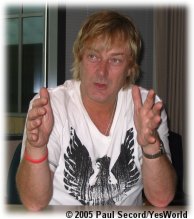 GEOFF DOWNES: Yeah, I mean I think we bumped into each other at various trade
shows and things over the years, but once we got the Prince's Trust
thing underway... Alan was working on his album or starting to work on
his album, and it was just sort of a nice thing for us to get back
together again and effectively put the DRAMA lineup back together
again, if only briefly for the Prince's Trust show, and it was nice
to have Trevor Rabin involved as well. So it was more of a kind of a
bunch of friends getting together, and I think that when Alan said,
"Look, you know I'm working on this album. Do you want to play keys
on it?" I said, "Yeah, I'd love to," and it kind of escalated from
there really. GEOFF DOWNES: Yeah, I mean I think we bumped into each other at various trade
shows and things over the years, but once we got the Prince's Trust
thing underway... Alan was working on his album or starting to work on
his album, and it was just sort of a nice thing for us to get back
together again and effectively put the DRAMA lineup back together
again, if only briefly for the Prince's Trust show, and it was nice
to have Trevor Rabin involved as well. So it was more of a kind of a
bunch of friends getting together, and I think that when Alan said,
"Look, you know I'm working on this album. Do you want to play keys
on it?" I said, "Yeah, I'd love to," and it kind of escalated from
there really.
MOT: So it was a real buzz for you guys to get back together with
Chris and Steve, and like you said with Trevor as well, but having
that lineup again. How did it feel for guys after all those years,
actually playing together in that ensemble environment?
AW: Well, it's actually good, because you know you can only play
just so many things so many times [with] Yes music, and this is a
breath of fresh air because we're bringing music back from the '80s
that we're doing, like from DRAMA, and it's exciting to play that
music again, because we've never played it for 20-odd years. So to
play this is kind of challenging, because we were all younger then,
but now it seems to be as good as ever. It feels really good to play
all the stuff, and we're getting a buzz out of it.
MOT: And the band White pretty much got a jump on things, because
you were performing songs from DRAMA.
AW: Right. Yeah, because I thought it's a different thing, because
DRAMA's the material that Jon never sang, so I thought it was an apt
situation that we perform stuff like that first, that Jon never sang
on, so it's good to stay away from that era, but perform stuff from
the '80s, which a lot of people haven't heard for a long time.
MOT: Geoff, have you really been listening to these DRAMA tunes for
a long time, or did you revisit them for the first time after a long
period?
GD: Well, I think that a lot of people mentioned it to me in the
past, because obviously quite a few people that come to see Asia
also follow Yes very closely as well, so the two bands have got
quite a bit of cross-pollination in terms of the fan base, and a lot
of people said to me over the years, they said I'd love to see you
guys get up and play "Machine Messiah" and "Tempus Fugit" again, and
you know when we got together in London earlier this year, it was
great to be able to play that stuff again. I mean, I had forgotten
some of the stuff [laughs].
AW: We all had [laughs]. But and then we had to kind of pull Chris
along with it a little bit, and Chris actually was very surprising
after a couple of run-throughs, because I'd been playing it, and
Geoff was tuning into it, and Chris was kind of lagging behind a
little bit like he usually does, and then basically he, within two
or three run-throughs, he was remembering all of the parts again.
GD: As you go into it, you do actually realize that the stuff from
DRAMA was pretty complex and pretty far out in terms of the
arrangements, and "Machine Messiah" is very complex piece, so I
think it is nice first to go back and look at that again,
definitely.
MOT: Was it just three of you or was Steve with you?
AW: No, Steve had some prior commitments. He had gigs in Holland, so
he couldn't make it, but I think he's been doing his homework, so
when he gets here to rehearse he should on par, otherwise we'll drag
him along with us.
GD: [Laughs]
MOT: What songs are you considering, and what's it like looking at
these songs again?
AW: Well, pretty much "Machine Messiah", "Tempus Fugit", and I'd
mentioned, like you know, "We Can Fly from Here", which we'd been
listening to and
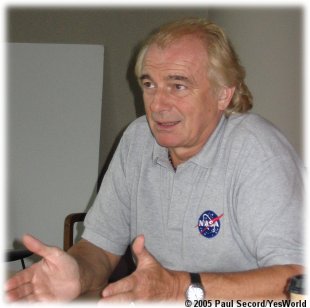 everybody seems to think it's a good idea to do
that song, because we haven't done it since Madison Square Garden, so it'll be a good, extra bonus kind of thing to do on stage, so
we're going to work on putting that together, which by the way,
we've been listening to the live version, and I think it's going to
be really great. everybody seems to think it's a good idea to do
that song, because we haven't done it since Madison Square Garden, so it'll be a good, extra bonus kind of thing to do on stage, so
we're going to work on putting that together, which by the way,
we've been listening to the live version, and I think it's going to
be really great.
GD: Yeah, the actual studio version of that wasn't completed,
because by the time we'd done the other material for DRAMA, that one
had sort of fallen a bit by the wayside, and we literally couldn't
get it on the album, so it wasn't actually completed in the studio,
the Eddie Offord, the DRAMA recordings, but we took it live, and I
think the live version is actually much more impactive then the
studio version we were working on.
MOT: So the studio version never really reached completion. You
started...
GD: Not really, no.
MOT: ... started to assemble parts and then it just kind of died? Is
that what you're saying?
GD: Yeah, well I think because we were concentrating on the other
stuff. You know, it was the days of vinyl...
AW: Yeah, there just wasn't room
GD: You have a certain physical aspect of... we had too much material
to fit onto two sides of vinyl, simple as that.
MOT: And that's most unfortunate. Too bad CDs weren't around at that
time, because as much as I like all the tracks on DRAMA, "We Can Fly
from Here" is really, really a stellar track, the way the band had
performed it live at that time. I was one of the fortunate ones who
got to see you guys play it.
AW: But you also heard the studio version, so that was a good
blueprint of what we were doing, and then we changed it.
GD: Yeah, but it was actually the first track that was put forward
for DRAMA. We actually started working on it together, so I think
that it's significant that we are doing it as a kind of period
piece, you know, and I think a lot of people would like to see that
live.
MOT: I think you hit the nail on the head, because except for fans
that may have heard it through bootlegs and such--even though it is
coming out on the live box set soon--fans are pretty much unfamiliar
with it, so it will be an exciting addition, but that aside, it is a
really an exciting track, and if you play it like you did with the
same arrangement back then, then I think it's going to be one of the
high points of the show.
AW: Yeah, I think it'll be great. It will be a nostalgia factor
MOT: I would like for Geoff to put a rumor to rest.
Maybe you've answered this before, but I'll ask it anyway. There's a
rumor that "We Can Fly from Here" was once demoed with you and
Trevor and Chris Squire and Bill Bruford. Is there any truth to
that?
GD: There's a lot of truth to that. Yeah, originally that was
the... although I'm not even sure whether Bill Bruford was involved. I
think it was mainly me, Chris, and Trevor, plus Paul Robinson, who
did the drum track, who was actually on the show...
AW: He's the drummer from--he was on the tribute...
GD: ... he was the drummer on the Price's Trust...
AW: He was the drummer on "Video Killed the Radio Star" and all that
kind of stuff.
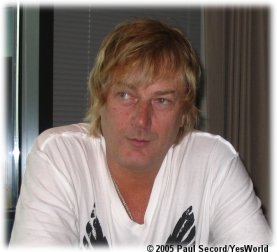 GD: He was Buggles' drummer, basically, and so I think he did the
original drum track on that. We worked with Bill Bruford on another
track, but I don't think that ever came to any specific... never really
happened. GD: He was Buggles' drummer, basically, and so I think he did the
original drum track on that. We worked with Bill Bruford on another
track, but I don't think that ever came to any specific... never really
happened.
MOT: The track you played with on Bill Bruford never saw the
light of day.
GD: No.
MOT: Ok well great, you put that rumor to rest.
GD: That is, as far as I can remember, Trevor might have another
slant on it, but that's how I remember it.
MOT: Speaking of Trevor, there's lot of question and speculation as
to whether Trevor will join you on stage at some point during the
tour.
GD: I just heard this morning, which I've not even told Alan about
yet, but when Jim was in there talking to Trevor about the thing,
and Trevor's talking about coming up to San Francisco and joining us
there.
AW: Oh, ok.
GD: Because he's on a holiday in the area, and he said that he'd
quite like to try and fit it in [laughs].
AW: I've actually spoke to him, and he said "Let me know the dates
on the New York leg, and maybe I'll come and sing 'Machine'"... I said,
"Well we're doing 'Machine Messiah'," and he said, "Well, that's a
high B, isn't it?", and then I said, "Well, yeah, It's pretty high".
GD: [Laughs]
AW: And I said "We're doing 'Tempus Fugit'," and he said "I'll do
'Tempus Fugit'" [laughs], because it's pretty high, but he'll make
it. We'll just have to force him a little bit.
GD: I think it'd be nice... I think it would be certainly worth a photo
backstage for that one [laughs].
MOT: A lot of fans will be very, very excited for Trevor to join
you, although the timing there might be key, because if he comes on
in the middle of your set and leaves, people will say, what's he
doing?
AW: No, it would be at the end. Also, he would probably sing "We Can
Fly from Here".
MOT: Oh, he should.
GD: But I mean, there's the shows without Trevor, which are going to
be most of them. Kevin, Alan's singer, he's got a great voice, and
he can reach all of that stuff quite comfortably. The White band has
been playing that material anyway for the last few years, so they
kind of know that inside-out.
MOT: Getting back to White and your involvement there, when you
first heard it, can you talk about some of the tracks that grabbed
you and why they did?
GD: Well, actually around the time that we were doing the Prince's
Trust show, Alan gave me a copy of the album that they effectively
put together with their previous keyboard player, and he said,
"Well, you know we're looking at this. We want to actually re-record
some of this stuff and make it into something, a bigger kind of
concept." And that's really when I listened to the stuff I thought
there's some great songs on there, some really good songs, and they
wrote some more stuff and added a few more tracks... each level that
we've actually worked on the album it's come on another ten paces,
and we actually mastered it yesterday.
AW: It was really, really great going in there last night and
hearing the final... in fact when I walked in there and started hearing
the stuff, I said it finally sounds like a finished record, and
everything up to now is kind of like, "Oh well it's going to be like
this"... shifting kind of things around, but now it sounds like a
finished product.
GD: There's some very powerful rock choruses as well as some very
progressive playing, so it's a good combination of accessible music
if you'd like, and it's not eclectic stuff; it's quite melodic rock.
I think it's a great angle.
MOT: I agree, some very, very creative and accessible tunes.
AW: You can take the Yes root down here and start, but with my last
solo thing, RAMSHACKLED, I go to the side a little bit, when I stick
to the kind of things to more explore other areas... it's a little bit
out of direction from the Yes thing, but it's got elements of all
that kind of stuff in it.
GD: You're not going to wait another 30 years before putting another
album out? [Laughs]
AW: It takes 26 to think about it.
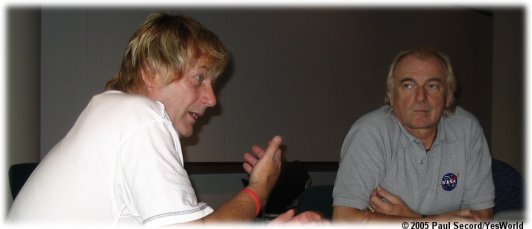
MOT: To be clear, even though the band is called White, and you were
the genesis for bringing the musicians together, it really is a
band...
AW: It's really a band; it's pretty much a democratic kind of... we all
have a say in what's going on. I'm not the kind of guy who wants to
rule the roost and say, "You must do this." We talk about a lot of
things together and come to an agreement.
GD: That's one of the things that is why I liked to be involved,
because it wasn't Alan and a bunch of guys. It's basically... I mean it
is ostensibly Alan's band, but as he said each person puts in an
equal amount ...
AW: Absolutely, and they're all great guys to work with, very
amicable.
MOT: That's the point I was trying to make. It wasn't just a
project in the sense that you just wanted to put out an album, so
you brought some friends in to play some parts, it's basically very
organic. You are a real band.
AW: It's very organic, and it's people I've known for a long time,
and we have a good relationship socially as well as musically.
GD: I think also the band's got its own style as a result of that,
and I think that there's not anything you can say, "Oh, it sounds
like that or it sounds like that." It's actually developed its own
style, and I think certainly from the original stuff that Alan gave
me and the way it is now, it's got a very, very organic sound to it.
In terms of taking that to a live stage I think it's going to really
work, really well.
AW: I think you can enhance it even more live.
GD: Yes.
AW: Because we're going to be pretty much firing on eight and just
really, really having a good time out there.
MOT: When you say enhance it live, can you be more specific?
AW: I think the band is very live sounding on the record,
which was the object in the first place, to make it feel like it was
a live situation, have some people reacting with each other,
playing... and basically I think that will probably further itself,
like it always did with Yes. A lot of things were constructed in a
way that was regimented in the studio, but when it got live, it
became more organic and kind of that's what developed in the music.
MOT: When you [Geoff] came into this project, White was already a
functioning unit. Did you have carte blanche in terms of creating
your parts, or did you guys discuss the type of things you wanted?
Did you say to Geoff, here's what we're looking for here... ?
AW: I told Geoff straight away, I said just come in and give it a
listen and put what you are on it...
GD: Yeah, he said just be yourself on that, so that was a nice thing
to be able to do, because obviously they'd had their previous
keyboard player had done certain things on there that... but they just
said look, we're starting again and all this, and just do what you
do, and I think that's a genuine... that's what makes it sound organic
is that you got the genuine abilities of each person just doing
their thing, and it all comes together.
AW: Which is great, because listening to the stuff last night, we
brought some of that kind of definitely a keyboard factor out that's
definitely Geoff in it, so making the whole thing gel really well.
MOT: It's not a matter of coming up with what you thought sounded
right for the band, and you would probably have some conversation as
to what worked and maybe what didn't work.
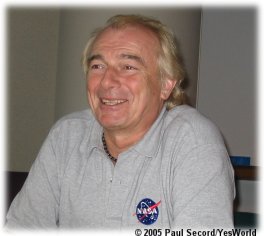 AW: Didn't really have to talk much. AW: Didn't really have to talk much.
MOT: Really.
GD: Yeah.
AW: It was just right there straight away.
GD: We just went straight in and got stuck in and said. "Let's have
some of that on there."
MOT: You pretty much nailed it, which is even more encouraging,
because you came in and you were at the right place at the right
time.
GD: Well, also I think that all the guys are very, very--not
accommodating, but they felt that I should play myself rather than
follow any other preconceived notions of what music should be.
AW: And copy other parts.
MOT: At the same time, hopefully they didn't coddle you and say "It
all sounded great." Did they have any objections?
GD: Of course they're going to push you in certain directions, but...
AW: No, I would have been out there in the studio and... [pounds fist
in other hand]
GD: Yeah, "That's rubbish!" [Both laugh]
MOT: Let's talk a little about the DRAMA days and touring back then.
Obviously there was some consternation from fans as far as Trevor
replacing Jon. While you were touring, did you experience much
negative reaction directly from the fans, on or off stage?
GD: I mean there was obviously, I mean it was hardest for Trevor of
course because you know he was replacing Jon. It was not so bad for
me, because I was replacing Rick, and you know you obviously had
Tony Kaye and Patrick Moraz before me, so the keyboard player thing
was not quite so precious to a lot of the fans, but obviously the
lead vocalist was a thing that was the real stumbling block I think,
and Trevor, to be fair to him, he rode quite a bit of stick from
some of the fans, and it was not particularly a role that he felt
most comfortable in, to be frank. And I still maintain that the
album stands up as a great album, and when we did cut the stuff
pretty good live as well, but you know obviously there were going to
be some fans that just wouldn't accept it on the basis that Jon
Anderson wasn't involved.
AW: Yes is like a chameleon changing colors all of the time. You
have to have that kind of attitude when you look at the band,
because it's been people are going in and out through all of the
years, so you have to be a little bit broad minded, and I think
Trevor actually filled his shoes great, and he did a tremendous job.
Some of the things are very difficult to sing, like "And You and
I"--it's very high, those types of songs, but I think I would say
90% of the time he reached those notes and really stood up for
himself.
MOT: Well, I was always of the opinion that what Trevor should have
done for those old Yes songs was to basically change the melody line
a little or sing it in a different octave.
AW: That's a really hard thing to do when it's so ingrained in
people's minds.
GD: It's very, very hard, yeah.
AW: If he starts changing parts of songs, it's like a thing that
Chris says all the time--he hates to do things where you join songs
together instead of playing the whole thing. Chris always says, and
I agree with him, if you do a song, you gotta play the whole thing,
or else other people go "Well, there's a bit missing", and if
there's a bit missing, they're kind of let down, so I think you have
to do everything in its entirety.
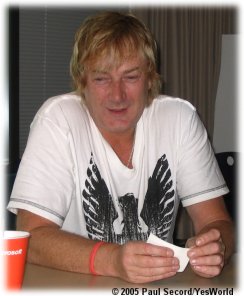 GD: And really melodically, a lot of that early Yes stuff was very,
very identifiable. The melodies were sort of etched in stone really,
so I think in many ways Trevor did have to follow that brief. I mean
it was hard for him, there's no doubt about that at all. But it
wasn't popular with some Yes fans I suppose when they took, or when
you guys took the next direction with 90125, which was really I
suppose continuing the DRAMA idea to some degree, and Trevor Rabin
came in. That again, certain Yes fans weren't happy with that
transition if you like. GD: And really melodically, a lot of that early Yes stuff was very,
very identifiable. The melodies were sort of etched in stone really,
so I think in many ways Trevor did have to follow that brief. I mean
it was hard for him, there's no doubt about that at all. But it
wasn't popular with some Yes fans I suppose when they took, or when
you guys took the next direction with 90125, which was really I
suppose continuing the DRAMA idea to some degree, and Trevor Rabin
came in. That again, certain Yes fans weren't happy with that
transition if you like.
AW: I think the attitude in the band was always trying to make
ourselves feel better, so we'd always say to each other, "Well, you
win some; you lose some," every tour and every album kind of thing.
MOT: But you were generally excited about this lineup as I recall,
you thought about calling it the NEW YES ALBUM.
AW: Yeah, at that time, like a new version of whatever we were doing
before. We were excited about it, and that's why we wanted to do,
and we were getting a lot of excitement from Geoff and Trevor at the
same time, because this was a new kind of functioning thing. It
started with Steve and Chris and myself. At that time- this is an
old story, but Rick and Jon went off to do their own kind of stuff,
and we booked a rehearsal room, and we said whoever turns up on
Monday morning is in the band.
GD: [Laughs]
AW: That's exactly what we said to each other, so we turned up at
Rodan studios and that was it. They were in the next room, and we
were playing, and they were kind of fans of Yes music. All of the
sudden it was like the marriage that kept creeping around. All of
the sudden equipment was in the room, and Trevor was in the room
singing, and that's what became DRAMA.
MOT: It came together, again, organically.
AW: Very organically, yeah, the whole thing.
MOT: What do you think were the high points of the DRAMA tour?
Do you remember any notable events?
GD: It was, I mean from my standpoint, it was a real challenge,
because I'd never done any shows like that before, and most of my
work before had been in recording studios, so to actually go take
that transition from doing pop mimes, you know, on some Spanish
television show doing "Video Killed the Radio Star", all of the
sudden, you know, it was like, now hang on a minute, there are
18,000 people going to be watching you tonight. That opening night
we did in Toronto Maple Leaf Gardens, was probably a significant
night for me, because it was the first time I actually had to get
through playing a 2½ hour show in front of 18,000 people-
AW: For all those people yeah...
GD: --and that was a bit of a baptism of fire, and once I'd got that
out of the way, that was pretty, pretty good.
AW: But believe you me, Yes fans being Yes fans, they were watching
him like a hawk, and anything he may have done wrong...
GD: [Laughs]
AW: ... would have been noted down. Anyhow, for me, I think as far as
highlights of that tour, I think Geoff and Trevor both did a
tremendous job just taking those shoes, but the fact that we were
recording with a new band with a new singer, a new keyboard player,
playing some old material, but some really modern new materials we
thought at that time, and to still sell out Madison Square Garden
three nights was a pretty good achievement.
MOT: But there were venues that didn't sell quite as well.
AW: Yeah, obviously because people wanted to see what they thought
was the real thing from the past at that time.
MOT: I also have to wonder if it had to do with where Yes was at in
terms of the musical landscape at that time, because punk was coming
to the fore, and it wasn't that fashionable to like Yes.
AW: You can't rest on your laurels all the time and play things that
you did in the '70s and just forever and ever and ever and ever, and
that's part of the reason of this kind of project right now with our
White project and Chris' Syn project, and doing the DRAMA stuff at
the end is a new adventure for us.
GD: I think also in terms of looking at it in a cold business
fashion; it wasn't a disaster, the album did ok in America. It went
gold; it was number 2 in the UK, and people weren't buying it
because necessarily... I think people were genuinely excited to hear
what it was all about, so I think the album stood up in terms of a
commercial... it wasn't a massive selling album, but at least it did
have some kind of an impact both in the US and the UK. I think our
big problem was when we took the tour to the UK, and without all
this sort of trappings of the big circular stage and everything like
that, we were doing the theaters, most of which were sold out, but I
think the actual presentation of it didn't look right for a lot of
Yes fans, so I think that was a bit of a banana skin on the whole
DRAMA thing, which is probably why didn't really take it much
further, at that time.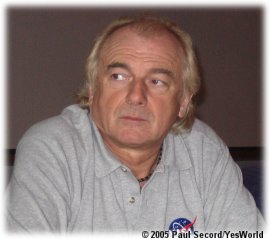
AW: And in this period we're going through right now, I feel is like
the Yes thing is kind of over here and it's on hold right now, but
this is a kind of in some way a similar kind of situation where
we're just venting what we have and getting out what we have, and
making it something different right now with a view to other things
down the road. Who knows what will happen down the road?
GD: But one thing is that it's actually great music to play live.
AW: It's great live, to play.
GD: I mean the DRAMA stuff is great. When we sat down a couple
months ago in London and started working through it, it really is
challenging, there're some great moments in it, and that's the bit
I'm really looking forward to is actually playing it again.
AW: Yeah, me too. It certainly makes you keep your chops up, because
"Machine Messiah", "Tempus Fugit"--those songs are not really that
easy to play live, so that's a good, important thing, and it really
keeps you together and on your toes.
MOT: To me, as a fan, it always felt like Yes. It did really sound
like Yes music.
AW: And there was a period of time where we going through it... I mean
it initially started with like I said, Steve, Chris, and myself, and
developed into this through influence through Trevor and Geoff, and
it turned into something else.
MOT: What's it going to be like for you juggling two bands here? Is
this going to impact your involvement with Asia?
GD: I don't think so. I mean, we've done quite a lot of work over
the last year, and I think I'm going to be taking a little time out
of the Asia thing to do, not necessarily just to do this, but I
think it just helps you to keep fresh, keep doing different things,
and, yeah, the rest of the year is going to be pretty much dedicated
on hoping we're going to take this show into Europe, and who knows,
next year we'll probably do another album I would have thought, if
the thing's going off...
AW: We've got plenty of material, that's for sure. There is a lot of
material that's still hanging around.
MOT: And since your involvement with DRAMA, I don't think you have
played with Chris in a long time.
GD: No.
MOT: You and Steve have had a pretty good relationship over the
years.
GD: Yeah... no, I mean we've always remained fairly close. I think that
the thing working with Steve is that we've always had a very good
understanding of guitar and keyboards specters working together. I
think Steve is very much an individual guitarist and quite a lot of
keyboard players I would imagine would find it quite hard to work
with him on the basis that he's very much a lead orientated, a lot
of his parts are very individual melodies and things like that. I
think that my style of keyboard playing is a little bit more
suitable to work with Steve, and that's probably why we get on
pretty well, because I tend to work more in an orchestral supported
role.
AW: But you're also very articulate in the lines, and I think when
you work with Steve, you both kind of very, kind of forgiving, so
you have to be very forgiving and let the other guy do what he's
doing for you to get through.
GD: So, I'm looking forward to working with Steve again on this
stuff. I think it's going to be great.
MOT: Has Steve conveyed to you he's very excited about doing the
DRAMA songs...?
AW: Yeah, I haven't actually spoken to him for a couple of weeks,
but apparently Chris spoke to him the other day... and he said Steve's
he's a very happy camper. He's ready to go kind of thing.
MOT: Steve just loves to play. He has other interests, obviously,
but music is in his blood, definitely. What are the long-range plans
for this particular tour, outside of America? Do you see this going
all over the world?
AW: Let's say this is a little bit of an experiment right now, and
people are viewing it like that in the business; it's an experiment,
a venturing out with individual bands like this, and so I think a
lot of people, maybe three or four gigs into the tour, are going to
start to see that this is a well-developed kind of thing that can
work, and I think the show will be a great show in general.
Obviously any Yes tour take almost a week to kind of get in shape,
so we're going to have a few gigs to get this in shape, but once
it's in shape and we all know what we're doing, this thing's going
to take legs.
GD: I think also it's going to be, there's quite a lot of variety in
the show obviously having Steve's solo section in the middle. Syn is
a very different type of band to White, and then you've got the
closing segment with the DRAMA stuff. I think it's quite a good
variety, and I think maybe Yes fans, that have seen, they've seen
the classic lineup-
AW: In different formats [laughs].
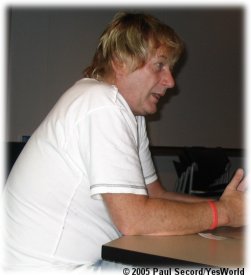
GD: --they've seen these guys play "Roundabout" and all that era
stuff. They've seen it many times, and I think this might hopefully
be a sort of refreshing change for them to see the same guys but
with a different angle.
MOT: From the perspective of this Yes fan, I don't want to hear any
non-DRAMA songs.
AW: [Laughs] Not for a while.
MOT: I mean especially considering you have so little time to play
as a unit on this tour. I definitely want hear those songs that you
mentioned, in particular "We Can Fly from Here".
AW: I think I'm going to throw one other Yes song in my set.
MOT: That's different.
AW: It will just be one thing that's different maybe from 90125 era
and stuff that will just like say, oh there's a little bit of that
there, but just a teaser kind of thing.
MOT: Actually that's exciting, because it's your band playing it so
it has a different spin on it, but it's not the unit playing the
song instead of, say, "Run Through the Light" or something else that
hardcore fans would rather hear the band play, so I think in that
context that really works.
AW: Yeah, and it's just a different angle, so we're kind of moving
around those areas and playing stuff that we hadn't played in a long
time.
MOT: You touched on the possibility that should Yes come back
together...
AW: Yeah, I mean who knows. We're all just open-minded through the
end of the year, and we'll see what happens at the beginning of the
year next year. Many things can happen, and Yes is like a chameleon
changes color all of the time, and it could be a completely new
group of guys next year [laughs] playing Yes music. You don't get
Yes clone bands anymore, so it's like I think they all dissipated.
What was it, Starcastle [laughs].
GD: Yeah, Starcastle, God I remember them
AW: Starcastle and there was another band somewhere back east, and
they used to dwell on doing...
MOT: Well, not to go off on a tangent, but I remember from a fan's
perspective Starcastle kind of filled a void because that's the
period where you were recording all your solo albums. There was no
Yes product, and here you had a Yesish sounded band...
AW: Yeah, they were capitalizing on the situation, when we all went
off on tangents like this, but then we came back together, and were
stronger than ever, so sometimes that happens. You just go do this,
and you come back and it's really fun.
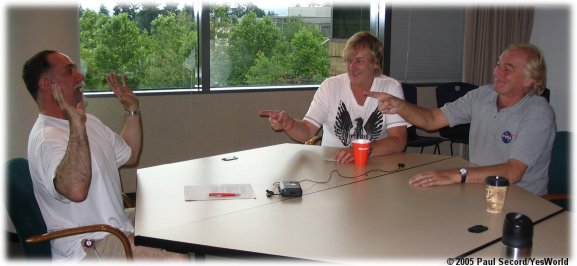
MOT: The result was GOING FOR THE ONE, which is a stellar album in
Yes' catalog.
GD: But in terms of Yes... quite a lot of activity really, because
everyone's got their own sort of project albums coming out, with
Alan's band, Chris' band, so this is a lot of activity of stuff
coming out, and I think Jon Anderson's got an album out as well, as
far as I know.
MOT: No, I don't think he's got an album, but he's going on a
European tour.
GD: That's right.
MOT: And he does have a DVD coming out.
GD: So yeah, I don't think people should be disappointed. I think
it's maybe a refreshing change for them.
AW: It's just we want to impress the Yes fans and keep their
dedication going to the cause, driving it forward.
|



 ALAN WHITE: It stems from Merkaba, which was a local band in Seattle. It had
a reputation... a few people left, few people joined and that kind of
thing, and over a period of the last seven years I suppose I played
with Steve Boyce and Kevin the singer and really struck a
relationship with them.
ALAN WHITE: It stems from Merkaba, which was a local band in Seattle. It had
a reputation... a few people left, few people joined and that kind of
thing, and over a period of the last seven years I suppose I played
with Steve Boyce and Kevin the singer and really struck a
relationship with them.
 GEOFF DOWNES: Yeah, I mean I think we bumped into each other at various trade
shows and things over the years, but once we got the Prince's Trust
thing underway... Alan was working on his album or starting to work on
his album, and it was just sort of a nice thing for us to get back
together again and effectively put the DRAMA lineup back together
again, if only briefly for the Prince's Trust show, and it was nice
to have Trevor Rabin involved as well. So it was more of a kind of a
bunch of friends getting together, and I think that when Alan said,
"Look, you know I'm working on this album. Do you want to play keys
on it?" I said, "Yeah, I'd love to," and it kind of escalated from
there really.
GEOFF DOWNES: Yeah, I mean I think we bumped into each other at various trade
shows and things over the years, but once we got the Prince's Trust
thing underway... Alan was working on his album or starting to work on
his album, and it was just sort of a nice thing for us to get back
together again and effectively put the DRAMA lineup back together
again, if only briefly for the Prince's Trust show, and it was nice
to have Trevor Rabin involved as well. So it was more of a kind of a
bunch of friends getting together, and I think that when Alan said,
"Look, you know I'm working on this album. Do you want to play keys
on it?" I said, "Yeah, I'd love to," and it kind of escalated from
there really. everybody seems to think it's a good idea to do
that song, because we haven't done it since Madison Square Garden, so it'll be a good, extra bonus kind of thing to do on stage, so
we're going to work on putting that together, which by the way,
we've been listening to the live version, and I think it's going to
be really great.
everybody seems to think it's a good idea to do
that song, because we haven't done it since Madison Square Garden, so it'll be a good, extra bonus kind of thing to do on stage, so
we're going to work on putting that together, which by the way,
we've been listening to the live version, and I think it's going to
be really great. GD: He was Buggles' drummer, basically, and so I think he did the
original drum track on that. We worked with Bill Bruford on another
track, but I don't think that ever came to any specific... never really
happened.
GD: He was Buggles' drummer, basically, and so I think he did the
original drum track on that. We worked with Bill Bruford on another
track, but I don't think that ever came to any specific... never really
happened.
 AW: Didn't really have to talk much.
AW: Didn't really have to talk much. GD: And really melodically, a lot of that early Yes stuff was very,
very identifiable. The melodies were sort of etched in stone really,
so I think in many ways Trevor did have to follow that brief. I mean
it was hard for him, there's no doubt about that at all. But it
wasn't popular with some Yes fans I suppose when they took, or when
you guys took the next direction with 90125, which was really I
suppose continuing the DRAMA idea to some degree, and Trevor Rabin
came in. That again, certain Yes fans weren't happy with that
transition if you like.
GD: And really melodically, a lot of that early Yes stuff was very,
very identifiable. The melodies were sort of etched in stone really,
so I think in many ways Trevor did have to follow that brief. I mean
it was hard for him, there's no doubt about that at all. But it
wasn't popular with some Yes fans I suppose when they took, or when
you guys took the next direction with 90125, which was really I
suppose continuing the DRAMA idea to some degree, and Trevor Rabin
came in. That again, certain Yes fans weren't happy with that
transition if you like.


